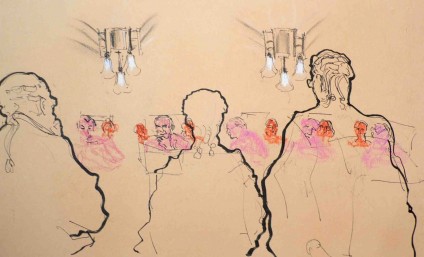[contextly_auto_sidebar id=”8yPe7fsudKyUaAx2kOaj9mflcMUUMtnd”] Last Monday I watched the trial of Stephen Gough in the Winchester Crown Court.
Mr Gough, a former Royal Marine, was accused of being naked in a public place. [Read court report here]
Now public nudity is not in itself a criminal offence in the UK; whether a particular instance of nudity is criminal or not depends on the specific facts of that particular instance. However, Mr Gough, also known as the “Naked Rambler”, has clearly annoyed the authorities by appearing naked in public too often.
As a result, they have imposed an “Anti-Social Behaviour Order” on him, which prevents him from being naked in public. This is a strange situation. ASBOs were created to deal with persistent, low-level anti-social behaviour which might not necessarily be criminal, but which harasses, alarms or distresses other people so much that it needs to be stopped: loud music, drunken behaviour, vandalism, graffiti and so on.
Once an ASBO is in place, any breach can constitute a criminal offence leading to up to five years’ imprisonment. Such draconian powers are poorly suited to dealing with complex conduct where fundamental British freedoms – like freedom of expression – are at stake.
As I understand it, Mr Gough (like many other people who appear naked in public) was trying to make a serious statement when he appeared naked on the streets. He can no longer make this statement, as any public nudity now leads automatically to arrest and imprisonment. In court, Mr Gough was asked to wear clothes and refused.
As a result, he was not allowed to be present during his own trial to hear the case against him, or to put his own case to the jury. The trial therefore consisted of the police telling the jury that they arrested Mr Gough as soon as he left prison (following the end of his last prison sentence for public nudity). They were waiting for him at the prison gate, and he refused to wear clothes.
The Judge told the jury that Mr Gough’s objections to the original ASBO were not relevant to the charge of breaching the ASBO. Having thus heard one side of the story the jury retired for eight minutes and then pronounced Mr Gough guilty, and he was sentenced to two-and-a-half years’ imprisonment. This is to be added to the eight years Mr Gough has already served in prison for public nudity; and since the ASBO is perpetual the same thing will happen, again and again, until Mr Gough dies in prison.
There is clearly a fundamental problem with the use of an ASBO in Mr Gough’s case, and I hope that common sense will prevail and that the ASBO will be ended soon. But I want to end with a thought about the trial itself, and the fact that the Judge did not allow Mr Gough to defend himself naked. Perhaps she wanted to preserve the dignity of the proceedings.
But I saw two things on Monday: a naked man in the dock – for a few minutes – followed by a jury trial without a defendant or a defence.
Both of these sights are unusual. But of the two, it was the second, with the jury reduced to the role of the prosecutor’s rubber stamp, that was the strangest, and by far the most sinister.






